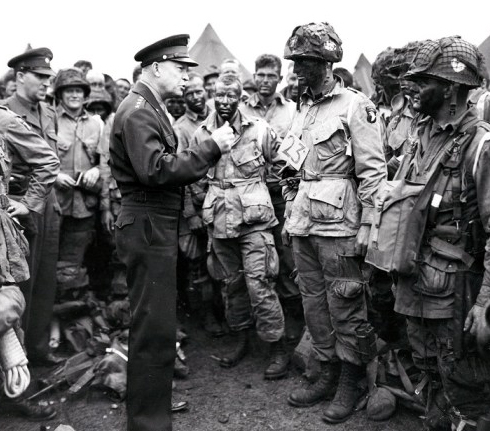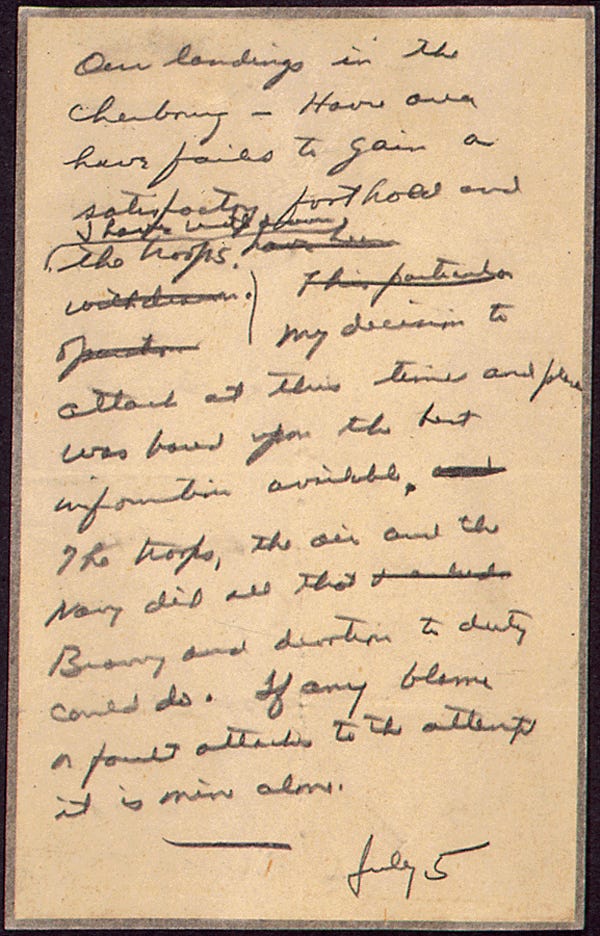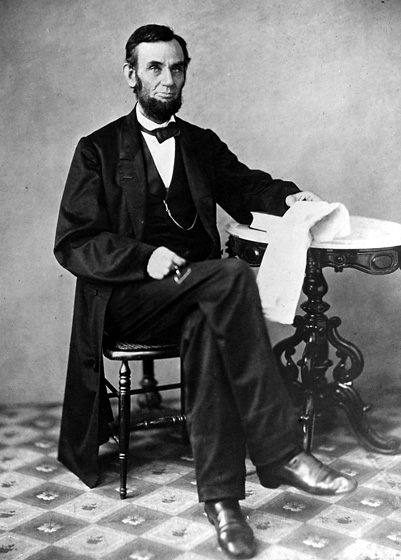
Conditions gave him little cause for optimism. A large low-pressure weather cell had socked-in England and occupied France. Low clouds and high winds portended the worst circumstances for a crossing of the English Channel. The Supreme Headquarters Allied Expeditionary Forces commander chain-smoked his Camel cigarettes and shared stiff drinks with other SHAEF members at the back of the Red Lion public house in Southwick, England, waiting for better news.
It came on June 5, 1944. The rain let up. Winds abated. The Channel calmed. And Gen. Dwight Eisenhower reclaimed the element of surprise and unleashed “Operation Overlord” against Nazi-occupied Europe on June 6, 1944.
“You are about to embark upon a great crusade,” he wrote to Allied troops on the eve of D-Day. “The eyes of the world are upon you…”
There’s a famous photograph of Ike, as he was nicknamed, on the eve of the invasion – surrounded by members of the U.S. Airborne, their faces blackened for camouflage and in full paratroop battle dress – giving a final pep talk at bases in southern England. He looked as optimistic as any military commander could be expected to be.
But what the 160,000 troops who landed successfully in Normandy the next morning did not know, was that Eisenhower had written a second letter:

“Our landings in the Cherbourg-Havre area have failed to gain a satisfactory foothold and I have withdrawn the troops,” Eisenhower wrote just in case.
“My decision to attack at this time and place was based upon the information available. The troops, the air and the Navy did all that Bravery and devotion could do. If any blame or fault attaches to the attempt it is mine alone.”
The “mea culpa” letter never had to be issued. The Allied invasion of Normandy landed successfully, 76 years ago this Saturday. But in the tradition of responsible leadership under pressure, Gen. Eisenhower wrote the letter accepting blame anyway.
Like other U.S. leaders with legitimate wartime experience, the general recognized that with power came responsibility. Ike proved himself worthy of the title “wartime leader” and quite understandably built on that credibility to win the White House for two terms (1953-1961).
I’ve thought about Eisenhower and other American leaders in troubled times a great deal this week. Then, Monday night, as his country spiralled deeper into chaos over what many consider his mishandling of the COVID-19 pandemic, the killing of George Floyd (a black Minnesotan), and street violence in dozens of U.S. cities such as we haven’t seen since the 1960s, we watched…
We watched President Donald Trump apparently order police to fire tear gas and rubber bullets into hundreds of peaceful demonstrators in front of the White House, so that he could cross Lafayette Square for a photo opportunity in front of St. John’s Episcopal Church. Defiantly holding up a bible (for some reason), Trump mythologized himself a president in war.
Well, Mr. President, I’m afraid you’re no wartime president.
I’ve never claimed to be a scholar of U.S. presidential history, but I’ve probed the times of several American presidents whose mettle in war and peace was tested and proven more credibly than Donald Trump will ever know.

I think of the tribulations of Abraham Lincoln wrestling with the Emancipation Proclamation (freeing hundreds of thousands of African-American slaves) and the resulting U.S. Civil War. I think of Woodrow Wilson leading his country in the latter stages of the Great War, while drafting his 14 points of peace for a future league of nations. I think of Franklin D. Roosevelt steering his country through the darkest days of the Depression and even darker days in the Second World War. I think of Jimmy Carter and the Iran hostage crisis (1979-81). I think of John F. Kennedy staring down the Soviets in the Cuban missile crisis of 1962.
I believe these are presidents worthy of the title “wartime president,” not the former reality TV host, pandemic-denying, impeached, so-called commander-in-chief who has not once presented himself to his fellow citizens as a leader displaying empathy, inspiration or hope under fire.
“We will accept nothing less than full victory!” Dwight Eisenhower wrote in his published letter of June 5, 1944. “Good Luck!”
As history reveals, the SHAEF commander did not have to read or publish his letter accepting full responsibility for a disaster on D-Day. His American, British and Canadian armed forces won the day 76 years ago this week.
Of note, when the “blame” letter was finally disclosed in Gen. Eisenhower’s papers, it showed a very down-to-earth wartime leader; he had accidentally dated it July 5, not June 5. I guess the SHAEF commander had lots on his mind that night.
But unlike his 21st century successor in the White House, Gen. (later President) Eisenhower had the sense and strength to live up to his decisions and take full responsibility of leadership.